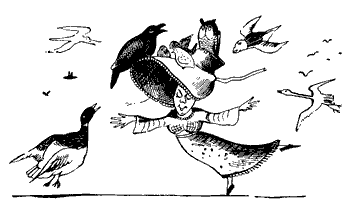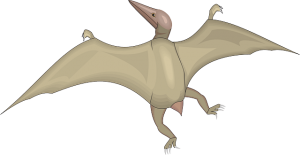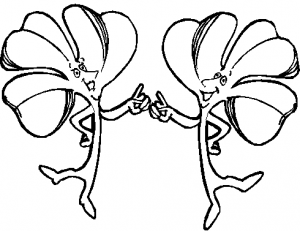Happy, Happiness and Happy Dances in Irish (mostly based on ‘áthas’) Posted by róislín on May 25, 2015 in Irish Language
(le Róislín)

‘Prótadhamhsa áthais’? Pictiúr ca. 1850 le Edward Lear, i bhfad sula raibh an focal ‘happy dance’ chomh ‘trendy’ (http://public-domain.zorger.com/a-book-of-nonsense/115-cartoon-happy-dancing-women-with-big-hat-perched-birds-goose-public-domain.gif)
“I’m just doing a little happy dance.” Recently overheard at an event I attended, where one of the coordinators had had to sit on the floor because all the seats were taken. At the end of the event, she got up, did some yoga-like stretches, and one of the other coordinators asked if she was OK. “Yes,” she answered, “I’m just doing a little happy dance.”
So, I thought to myself, hmm, “happiness” is such an interesting word in Irish, how would we say “happy dance.”
First, let’s review “happy” and “happiness.” In the last blog post, we looked at two words for happiness (áthas, lúcháir) and today we’ll look further at those, and a few more. But let’s start with “happy.”
Happy:
1) sona (as in “Lá breithe sona duit” or “Nollaig Shona duit” or “Tá mé sona sásta.”). Also, “sonasach“. “Sásta” on its own can mean “happy” but it often means “content” or “satisfied,” so it never seems to me to be as exuberant as “sona” itself.
2) séanmhar (also means “lucky” or “prosperous”). “Faoi shéan” is similar, but isn’t technically an adjective.
3) gliondrach (also means “joyous” or “mirthful;” has a slightly more poetic sound than “sona,” at least to my ear)
4) lúcháireach (also means “joyous” and “rejoicing,” used more to describe a situation, appearance or smile than for a specific comment on how you feel; e.g. gáire lúcháireach, a happy smile, although it could also refer to a laugh)
5) áthasach (also means “joyful” and “gleeful”), like “lúcháir,” typically used to describe a situation, appearance, or story (scéal áthasach)
There are more ways to indicate “happy” in Irish, but a lot of these get into prepositional phrases (like “faoi shéan“) so those will have to wait for another day.
Happiness:
1) áthas (also means “joy” and “gladness”). This is typically used with “orm,” “ort,” etc., in sentences like “Tá áthas orm” (Happiness is on me, i.e. I am happy) and “An raibh áthas ort nuair a chuala tú an nuacht?” (Was happiness on you when you heard the news?, i.e. Were you happy when you heard the news?)

Tearanódón (pteranodon) ag déanamh damhsa áthais. Ptarraingteach, nach ea? (Public Domain CC0, http://www.pd4pic.com/happy-wings-dancing-dinosaur-ancient-dance.html). And no, that’s not a new Irish initial consonant mutation. Just a little “pt” le haghaidh an chraic.
2) lúcháir (also means “gladness” and “exultation” and “joy in welcoming someone”)
3) sonas (related to “sona,” happy; also means “good luck” and “good fortune” — so this has more to do with a situation than an emotion per se; can be used in saying “thank you” (“Sonas ort!“), if you want a change from “Go raibh maith agat.”
4) séan (also means “good luck” and prosperity” and is found in the phrase “faoi shéan” [fwee hayn], as in “Athbhliain faoi shéan agus faoi mhaise duit“)
5) gliondar (also means “joyousness” and “mirthfulness”). This is typically used with the word “croí,” as in, “Cuireann sin gliondar ar mo chroí” (That makes me joyful, lit. That puts joy on my heart).
So that gives us five choices for “happy” and five related choices for “happiness.” How about our buzzword of the day, “happy dance”? While I don’t see any official version out there, I would plump for “damhsa áthais” (a dance of happiness). Second choice would be “damhsa sonais” (also “a dance of happiness). Why not the others and why not an adjective? They just sound a little formal for the lightheartedness (éadromchroíochas!) that the phrase “happy dance” suggests to me. Do bharúil?

Seamróga ag déanamh damhsa áthais. An port nó ríl nó cornphíopa é? (src=”http://cliparts.co/cliparts/kc8/o9n/kc8o9n5ri.png” width=”350″ alt=”Free Shamrock Clipart – Public Domain Holiday/StPatrick clip art …” />)
So, for “doing a happy dance,” we could say:
Tá mé ag déanamh damhsa áthais. (I am doing a happy dance).
Or, the above suggestions could be used with “rince” which also means “a dance” (rince áthais, rince sonais).
Bhuel, I hope you have ample opportunities to do happy dances in your life, at least “go hionadach” (vicariously) if not actually “ag déanamh an damhsa é féin.”
Or could I wish you, “Damhsa áthais sona ort!” — Happy ‘happy dance’ to you! SGF — Róislín

Build vocabulary, practice pronunciation, and more with Transparent Language Online. Available anytime, anywhere, on any device.




Leave a comment: